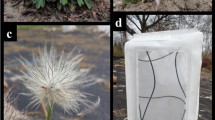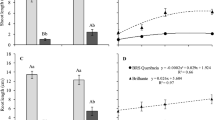Abstract
CACAO seed sensitivity to cold was first demonstrated by Boroughs and Hunter1. Previous investigations by Ibáñez2,3 have shown that a treatment of 4° C for 10 min will destroy viability in these seeds. Such a viability loss, however, was reversible if the seeds thus chilled were immersed for 10 min in a water bath at 37° C. Under such conditions, at least 85 per cent of the seeds remained viable and grew into healthy plants. After 15 min of such a cold treatment, however, no amount of post heat treatment could prevent ultimate death of the seed.
This is a preview of subscription content, access via your institution
Access options
Subscribe to this journal
Receive 51 print issues and online access
$199.00 per year
only $3.90 per issue
Buy this article
- Purchase on Springer Link
- Instant access to full article PDF
Prices may be subject to local taxes which are calculated during checkout
Similar content being viewed by others
References
Boroughs, H., and Hunter, J. R., Turrialba, 11, 160 (1961).
Ibáñez, M. L., Turrialba, 13, 31 (1963).
Ibáñez, M. L., Turrialba, 13, 127 (1963).
Ibáñez, M. L., Nature, 201, 414 (1964).
Ibáñez, M. L., and Casas, I. A., Turrialba, 13, 209 (1963).
Author information
Authors and Affiliations
Rights and permissions
About this article
Cite this article
CASAS, I., REDSHAW, E. & IBÁÑEZ, M. Respiratory Changes in the Cacao Seed Cotyledon coincident with Seed Death. Nature 208, 1348–1349 (1965). https://doi.org/10.1038/2081348a0
Published:
Issue Date:
DOI: https://doi.org/10.1038/2081348a0
This article is cited by
-
Aspects of the cold-hardiness mechanism in plants
The Botanical Review (1971)
Comments
By submitting a comment you agree to abide by our Terms and Community Guidelines. If you find something abusive or that does not comply with our terms or guidelines please flag it as inappropriate.



